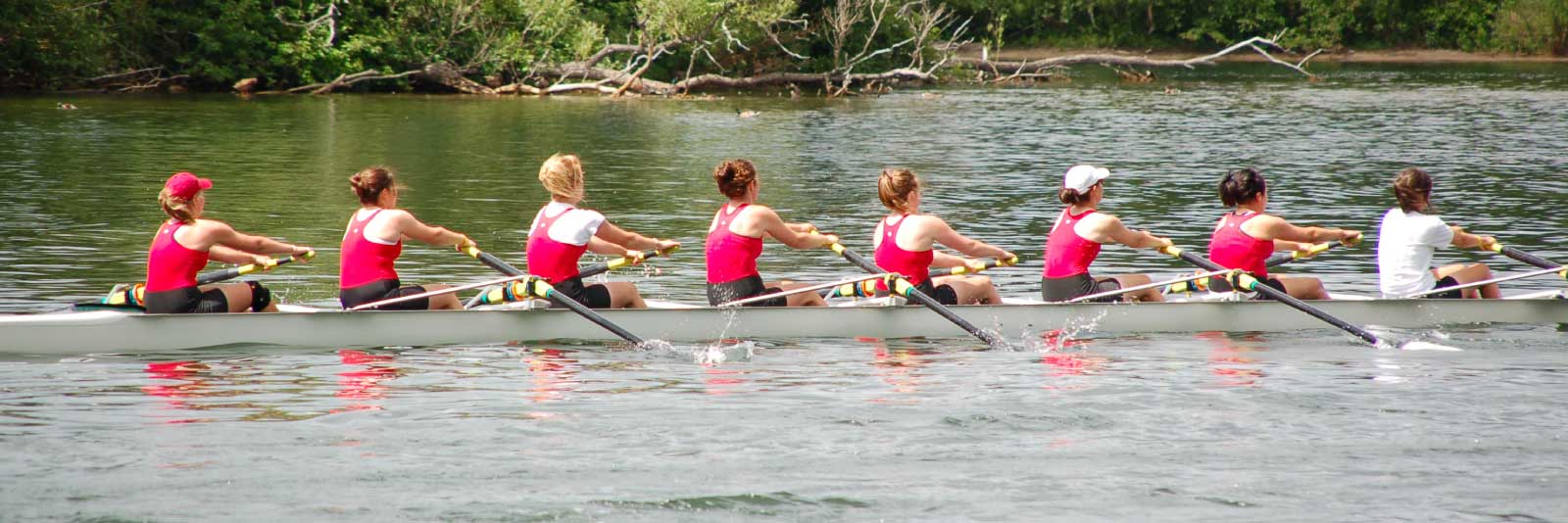
Women’s Rowing Camps
Finding the right rowing camps can be a tremendous benefit for athletes. There is something about an intensive process that spans multiple days where you only focus on rowing that tends to get rowers to improve and find a new gear in their performance. Camps can also offer a lot of information outside of just rowing on the water, including training, diet, mentality and race tactics.
FAQs about women’s rowing camps
- What to expect at summer rowing camps
- Are women’s rowing camps important in recruiting?
- What are some of the best rowing camps?
What to expect at summer rowing camps

Summer rowing camps hosted by colleges offer insight into how college coaches approach practices and skills development, how student-athletes train at that college and what level of competition athletes may expect when trying out for a roster spot. Daily sessions will help rowers with physical training, including technique, endurance conditioning and strength conditioning. Most camps also include instruction on the mental side of rowing, including video analysis and racing tactics.
To get good at rowing, athletes will have to undergo a lot of repetition. Effective training for rowing includes thousands and thousands of effortful strokes on the water and on the ergometer to expand aerobic capacity and improve form. This means that attending a rowing camp for a few days will not magically change someone’s rowing technique or 2k erg, even with the best collegiate instruction. However, athletes will still learn valuable skills and information—perhaps the most valuable being getting in the mindset of a collegiate rower. But athletes shouldn’t go into a camp imagining that their erg score will drop by 10 seconds in a couple of days.
In many sports, athletes go to camps to get identified by college coaches. This is less of a focus at women’s rowing camps and athletes should anticipate that they’ll be benefiting from improved technique, new workouts and deepening their knowledge of the sport. Make sure you’ve properly set your expectations and researched which rowing camps are right for you
Are women’s rowing camps important in recruiting?
College rowing camps can help athletes improve their technique, learn more about the sport and get evaluated by coaches, making them an important part of the college rowing recruiting process. College rowing camps are especially helpful for rowers and coxswains who may not have a lot of access to rowing in their region, which is a common issue for athletes in the plains region, Midwest and Southwest. These athletes can attend a camp to hone their skills and potentially check out a college they’re interested in.
Potentially the biggest benefit that college rowing camps offer is helping inexperienced, but promising athletes learn the ropes before they attempt to win a spot on a novice crew. Competing for a walk-on roster spot on a college team can be an intense process where athletes have to learn a lot in a short period of time. Athletes will be evaluated for their erg times and how quickly they pick up rowing technique on the water, and a learn-to-row camp can help prepare athletes for tryouts.
What are some of the best rowing camps?
The highest concentration of college rowing teams and rowing clubs in the country is found in the Northeast region. Therefore, it’s no coincidence that this is also where athletes will find the most rowing camps. These camps can range in experience levels, price and length, so it’s important to research ahead of time what they offer, how far away they are and if they fit your family’s budget. Rowing basics are covered at learn-to-row camps while advanced topics are covered at performance camps. Rowers looking to reach the next level may opt to attend a performance camp that may span a week or more and include meals and housing to provide an immersive rowing experience.
The prestigious Penn AC high-performance camp in Philadelphia, Pennsylvania offers an intensive program that includes two to three practices per day and spans one month with room and board included. Meanwhile, at the Cal Women’s Crew Camp in Berkeley, California, experienced rowers and coxswains receive rowing-related instruction from current Cal coaches and take part in lectures and discussions of the rowing stroke, training regimens and racing tactics. It’s one of the best camps on the West Coast.
Camps can be very helpful, but families should not equate attending camps with securing athletic scholarship money for women’s rowing at the college level—instead, they should approach them as a valuable learning experience. While camps do offer a great opportunity to improve one’s rowing skills and work ethic, families should always consider what fits their budget, because camps offer no guarantees of making a specific college roster.
Sign up for your free NCSA Recruiting Profile today to start getting on college coaches’ radar!